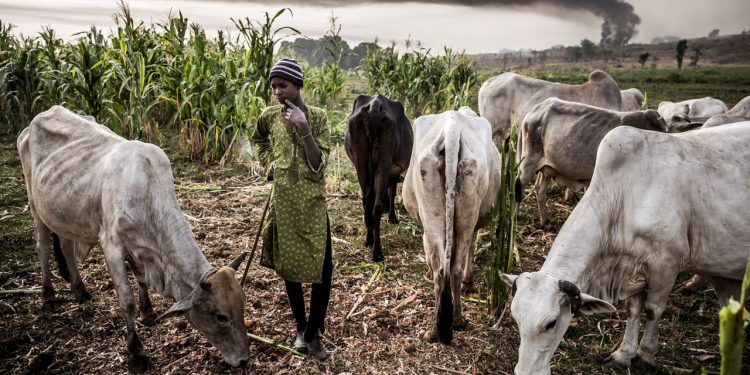The Church of Nigeria, Anglican Communion, has commended Southern governors for enacting a law against open grazing, while it accused the Federal Government of not being sincere in tackling insecurity.
Bishop of the Diocese of Calabar, Rt. Rev. Nneoyi Egbe, stated this at the weekend in a Presidential address delivered at the First Session of the 11th Synod with the theme: ‘Go Forward’ held at the Cathedral Church of the Holy Trinity in Calabar, Cross River State.
Egbe, who doubles as the Dean of the Cathedral, said the action was a welcome development that would help in preserving the natural heritage of the states as well as reduce incessant killings and destruction of property.
He said: “We implore the Southern governors to uphold and defend the territories they swore allegiance to protect.”
On insecurity, the Bishops accused the Federal Government of not being sincere, stating that so many lives have been lost because those concerned refused to take responsibility.
“Two things come to mind with the escalating insecurity challenge; one is that it appears the government has no idea what to do about the insecurity situation in the country. And secondly, is that insecurity appears to be a vehicle for establishing a secret agenda. If the leaders are honest and have no hidden agenda, let them show commitment to fight and end it.”
ALSO, Bishop of Ihiala Diocese of the Church of Nigeria, Anglican Communion, Prof. Israel Okoye, has warned that the insistence of the Federal Government to support open grazing may lead to food shortage in Nigeria.
Okoye, a professor of Political Science in Nnamdi Azikiwe University, Awka, before he ascended to the seat of the Bishop, stated this in a presidential charge he read during the second session of the fourth synod of the Diocese of Ihiala.
The former academic said the controversy about open grazing had become an unfortunate distraction from some fundamental issues on the economy, education, justice, equity, leadership and others that needed to be addressed.
While noting that though cattle rearing are key features of animal husbandry, he said “its politicisation and seeming treatment as national obligations have attracted objection and resentment. The assumption that the Constitution confers on cattle the right of movement along Nigerian roads and communities is untrue. Another erroneous stance is that cattle rearing is supported by the Federal Government, such that herders must be allowed to traverse any part of the country with their cattle as a guarantee for peace.
“Armed herders now migrate with their cattle to any place of their choice, occupy forests without the consent of the government in charge, to graze their cattle in people’s farms, where they kill, maim and rape women with impunity. The widely held feet-dragging of the Federal Government in arresting the fast-spreading dastardly acts of the armed Fulani herdsmen engendered ill feelings among the affected populations.”
Lamenting that the activities of the herdsmen have totally corrupted the image of the Fulani people, Okoye said if this continued, it would hinder Nigerian farmers from being productive and lead to food shortage.
“Today, farmers in many parts of Nigeria can no longer go to farm. If this continues, we run the risk of food shortage, which may lead to starvation.”
Speaking further, Okoye urged the electorate in Anambra State not to vote for any candidate with open grazing agenda in the November 6 governorship election in the state.
MEANWHILE, ex-servicemen, security experts and senior lawyers have urged the Nigeria Police Force high command to enforce states’ anti-grazing laws. One of them, a retired Deputy Inspector General of Police, Taiwo Lakanu, said if the police fail to do its job, local enforcement institutions can be mandated to charge offenders to court while prosecution will be carried out by states’ Department of Public Prosecution (DPP) under the auspices of Ministries of Justice as being done by Lagos State Traffic Management Authority (LASTMA) and Neighbourhood Watch in Lagos.
Lakanu said: “Police are bound to enforce any law enacted either by Federal or state governments, including edicts passed by local councils. There’s nothing like regional security outfits since there is no regional government.”
Four Southern states are yet to sign the anti-open grazing bill despite the September 1 deadline that was fixed for enactment of the law. Before the resolution of the Southern governors, the anti-open grazing law was already operational in Ekiti, Ebonyi, Abia, Oyo, and Bayelsa states.
Rivers and Ondo states joined the others in prohibiting open grazing on August 19 and 31 respectively. Enugu, Akwa-Ibom, Osun, Ogun, Delta and Lagos later enacted the law after the deadline.
In Anambra, the House of Assembly last week passed the bill into law, awaiting the governor’s assent.
Despite the resolution, Edo, Cross River and Imo states are somewhat reluctant about enacting the law. Edo State governor, Godwin Obaseki, has not sent the bill to the House of Assembly for consideration, while Ben Ayade, Cross River governor, has reportedly refused to sign a 2017 anti-grazing bill that was passed by the state’s lawmakers.[TheGuardian]
















The lack of solidarity of the Southern States is the reason for Fulani domination of the Country.